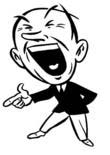
Moral Smugness
HARVARD DIARY
To denounce sin is, of course, to risk it in no small way — the meaning of that well-known biblical injunction that challenges the sinless one to throw the first stone. Tone or attitude matter enormously: how we regard our errant neighbors — with an understanding that takes account of our own limitations and worse, or with a righteousness that has turned to self-righteousness. No question, that word “understanding” can pose its own difficulties — the kind that refuses all judgments, as in the French aphorism, tout comprendre, tout pardonner, mentioned in an earlier column: Hitler, say, as victim of child abuse, as he seems to have been, at the hands of his violent, alcoholic stepfather, and that is that. Maybe the foregoing instance poses no trouble for us — Hitler was a monster, we agree, and to the devil with the childhood problems that may ultimately have given impetus or shape to his murderous hate. Still, I suspect that many of us have struggled hard with the temptation, in the name of modern “enlightenment,” to extend the limits of our forgiving, our understanding, even as we are also constantly inclined to notice the foibles and faults of our neighbors and friends, while giving ourselves, at a minimum, every benefit of the doubt.
All the time, at faculty meetings, at clinical conferences, or when I’m talking with students, or simply in the course of an ordinary day attending my chores, I find myself stumbling into one or the other of those two postures — I’ll be quick to pounce on someone, write him off morally in no uncertain terms, or I’ll bend over backwards to try to figure out what it is that may have prompted so-and-so to behave as he did, thereby avoiding for myself a tough, critical response to a given deed. Either way, I have to admit (on those occasions when I stop and think about things in a half-way honest manner) that I’m in great jeopardy. Often, when I’m quick to criticize someone, I’m apt thereby to distance myself all too decisively from that person: He is full of himself, she is a pretender, they are hypocrites — all qualities of mind that, of course, are beyond me! On the other hand, I have to acknowledge that a determination on my part to hold off with respect to judgment can prompt a similar psychological turn of events. I insist that I am not one to get involved in this, to have a critical say about that: the high and mighty stance of someone who fancies himself above and beyond the sweat and blood of a moral struggle — that “neutrality” we clinicians seek, and yes, regard with a pride that not rarely slips into smugness. Others may be unable to be “objective,” may let their passions take control of their scrutinizing intelligence, may quickly succumb to sentiment; but we are “trained,” are “professional,” have gone through hurdles, passed tests, been certified, and now are entitled to link ourselves to that word “science” in all its implications: seers of human understanding who don’t, won’t succumb to the rashness of reproach, who will, rather, stand on the high ground of diagnosis, clarification, and interpretation, the truth our accumulated knowledge enables us to offer, to pronounce.
You May Also Enjoy
When I was a small boy I lived in a quiet, comfortable town on a…
For many years Ralph Ellison’s Invisible Man has been a mainstay, a highlight of the…
The opening struggle for a New Jerusalem is naturally beyond anyone’s ken. A novelist, perhaps alone among us, has the capacity to make compelling guesses.

